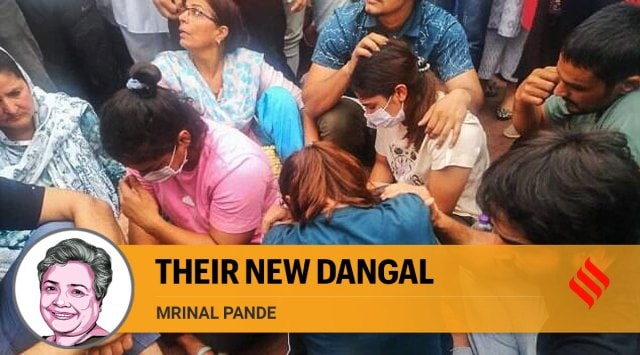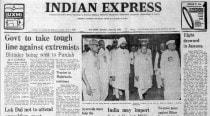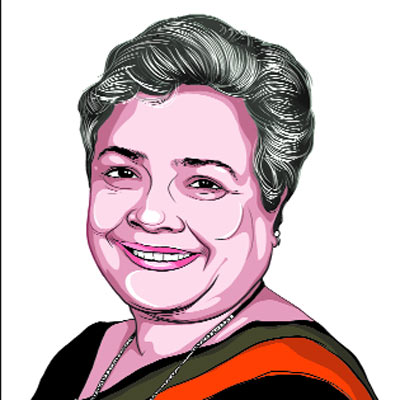As India’s wrestlers stand on the banks of the Ganges, let’s hang our heads in shame
The women athletes' heart-breaking gesture shows their resolve to stand up to demand justice against their abusers
 Protesting wrestlers sit at Har ki Pauri, in Haridwar district. (PTI)
Protesting wrestlers sit at Har ki Pauri, in Haridwar district. (PTI) Late Tuesday evening, some of India’s most successful sportspersons stood at the banks of the Ganga in Hardwar, threatening to immerse their hard-won international medals in the holy river. As twilight turned to darkness, they agreed to give the government another opportunity to ensure justice to the aggrieved wrestlers.
Cut back to Sunday, May 28 , at about 11:30 am, India’s Prime Minister inaugurated the new Parliament building and amid revived feudal rituals, received a Sengol (a sceptre symbolic of ethical and fair governance) from a high priest. Around the same time, a stone’s throw away, Delhi Police was busy wrestling with some of India’s globally-renowned wrestlers, who were demanding justice.
Among the protesters being pinned down and dragged away to police custody was Sakshi Malik, India’s first Olympic bronze winner in female wrestling. With her was Vinesh Phogat, a gold medallist at both the Commonwealth and Asian Games. The female wrestlers and some of their male colleagues and supporters had been sitting in dharna at Jantar Mantar since April to demand the arrest of the president of the Wrestling Federation of India and BJP MP Brij Bhushan Sharan Singh. Serious charges of sexually assaulting seven women wrestlers over a decade have been filed against him.
The protesting wrestlers had first reported the matter to the police, then the Indian Olympic Association and at last to the Sports Minister Anurag Thakur. Finally, they moved the Supreme Court and when the latter ordered the police to register the case, it did. The accused continues to be an MP and has refused to resign from the WFI, calling the charges baseless. So, the wrestlers decided to call for a women’s “mahapanchayat”.
On May 28, when the wrestlers threatened to break the police barricades and march to the new Parliament building, the police swung into action. Borders to Haryana and UP were blocked so prospective participants in the mahapanchayat could not enter the capital. The protesters were dragged away from the dharna venue in police vans. “If an Olympian … can’t demand justice and is not heard, imagine what must be happening to other women in villages and cities,” Sakshi Malik said. Vinesh Phogat stuck her head out of the window and screamed into the cameras, “Naya desh mubarak ho!”
The inauguration of the new Parliament was a grand spectacle but almost entirely dominated by the ruling party. The President and the Vice-President were conspicuously absent, as was most of the Opposition. TV screens showed visuals of elaborately attired priests chanting mantras and sanctifying the Sengol. The PM prostrated before them and accepted the sceptre. Like a King, he carried the sceptre ceremonially to the Speaker’s chair and installed it there.
But then, the real world came crashing onto our TV screens: Visuals of police manhandling women Olympians, champion wrestlers.
The media releasing the images seemed indifferent to the immense irony of it all. The TV anchors continued to recite a script that had been prepared for them, singing paeans to historical and architectural wonders on the occasion, as always politically correct and morally unmoved. It is no secret that the Wrestling Federation chief enjoys political protection and that while an opposition leader’s membership of Parliament was recently terminated on relatively minor and debatable grounds, a man being charged by over a dozen women of molesting them, refuses to even step down until the inquiry is over.
“Injustice anywhere,” Martin Luther King Jr said, “is a threat to justice everywhere.” I think of the wrestlers’ parents, anxious, fearful and worried for their gifted daughters. The PM sent them a congratulatory note each time they won a medal for the nation. That the wrestlers were willing to immerse these medals they had won for India — medals that symbolise their total devotion to their sport — in the holy Ganges and then begin a fast unto death is deeply significant. The intellectual Rajat Kanta Ray made a strong case for looking at such “communities of emotion”, which symbolise the emotions, identities and ideas among the people of a sovereign nation-state, as precursor to unfolding history. The gesture of immersing some of the world’s most prestigious medals in the Ganga, one of India’s most sacred rivers, sad though it is, also sanctifies the resolve of women standing up to demand justice against their abusers.
In his inaugural speech, the PM said the new Parliament building will witness the dawn of a self-reliant India. Lok Sabha Speaker Om Birla said, “… we take forward the established good traditions … Democracy is our precious heritage… the Parliament of India is the highest, most revered centre of the democratic system.” But one couldn’t help but recall the words of the late Justice J S Verma, to whose committee we owe the revised laws on rape: “The humiliating aspect of the crime against a woman is that her status in the hierarchical structure of society also (obstructs) the way of securing justice for her.”
Cases such as the ones involving the wrestlers demean not just our sportswomen but all women. The authorities reportedly view the sportswomen’s move to call a Mahapanchayat as “deliberate provocation”. To the keepers of the Sengol, an MP with serious allegations enjoying the grand inauguration of India’s new Parliament while the complainants sit under open skies for weeks, is not provocative.
But there is no going back, not for long anyway. The extraordinarily strong and gifted young women wrestlers, one feels sure, will soon return and rise, phoenix like, from the ashes of their humiliation.
The writer is a freelance journalist and former chairperson, Prasar Bharati








































